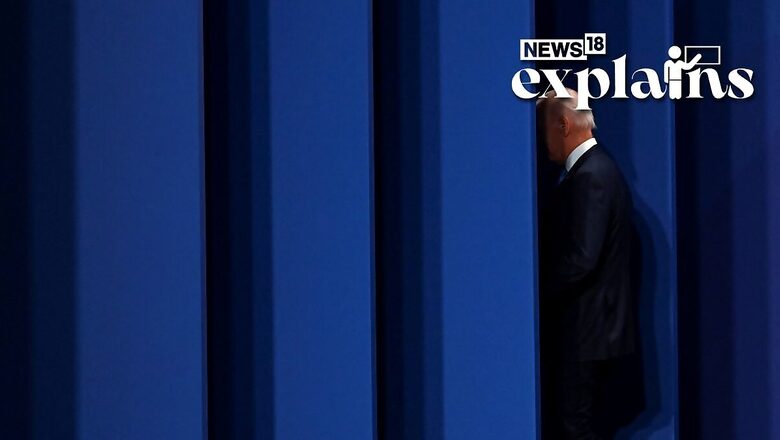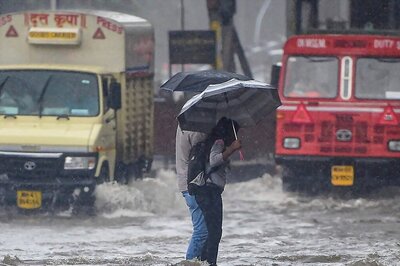
views
During an interview with CNN’s Fareed Zakaria, US President Joe Biden has said that Ukraine is not presently ready for NATO membership and stated that initiating the process to allow Ukraine to join the alliance in the midst of an ongoing conflict would be premature.
According to Biden, there is currently no consensus within NATO regarding Ukraine’s potential inclusion, and he emphasised the importance of first achieving a peace agreement with Russia before considering Ukraine’s NATO membership.
“If the war is going on, then we’re all in war,” Biden said, referring to the alliance’s commitment to mutual defense. “We’re at war with Russia, if that were the case.” He added that there would be “other qualifications that need to be met, including democratization,” for Ukraine to be considered for membership.
Ukraine’s Hopes of Joining NATO
Ukrainian President Volodymyr Zelensky on Sunday voiced hope for the “best possible result” from an upcoming NATO summit where Kyiv is hoping for a clear signal that it could one day join the alliance.
After meeting his Polish counterpart Andrzej Duda, Zelensky said the two discussed the summit, which opens on Tuesday in Vilnius, and agreed to “work together to get the best possible result for Ukraine”.
Poland is one of Ukraine’s biggest supporters within NATO and has said it wants “security guarantees” for the country from other NATO members.
Zelensky has said he does not expect Ukraine to actually join NATO until after the war but he hopes the summit will give a “clear signal” on the intention to bring Ukraine into the alliance.
Why is Ukraine So Keen to Join NATO?
Ukraine has expressed a desire to join NATO for several reasons. Firstly, NATO membership would provide Ukraine with increased military support and backing from the alliance, strengthening its defense capabilities. This would act as a deterrent to potential Russian aggression and enhance Ukraine’s security, as per a report by Conversation.
Becoming a NATO member would align Ukraine more closely with Europe and increase the likelihood of eventual European Union membership, which is another important goal for Ukraine. Membership would also facilitate a closer relationship with the United States, bringing political and economic benefits.
Joining NATO would also help Ukraine distance itself from Russia’s sphere of influence. It would signal a clear shift towards the West and demonstrate Ukraine’s commitment to shared democratic values and principles.
However, the potential membership of Ukraine in NATO is a contentious issue and could exacerbate regional tensions. Russia has expressed concerns and views NATO’s expansion as a direct threat. The prospect of Ukraine becoming a member has the potential to escalate existing tensions between Ukraine and Russia, leading to further geopolitical challenges in the region.
What is NATO, Anyway?
NATO, established in 1949, is a military alliance comprising the United States, Canada, France, the United Kingdom, and several other European countries. Over time, additional nations, including North Macedonia in 2020, have joined NATO, bringing the total number of member countries to thirty. The alliance’s headquarters, along with its 4,200 staff members and member country embassies, are located on the outskirts of Brussels, as per Conversation.
While NATO and the United Nations (UN) both involve international cooperation and receive financial support from participating countries, they have distinct purposes. NATO’s primary focus is on collective defense and military cooperation among its members. It is designed to respond to potential threats and engage in military actions if necessary. On the other hand, the UN works toward maintaining peace and security globally through peacekeeping operations, political negotiations, and other diplomatic means. Its mission is to prevent conflicts and promote international cooperation.
Although both organizations have Western powers, including the United States, exerting political influence, NATO and the UN serve different roles in the realm of international relations. NATO’s emphasis is on military readiness and defense, while the UN’s mandate revolves around fostering peaceful resolutions and cooperation among nations.
Why Ukraine’s NATO Aspiration is Confounding the West
President Biden’s foreign policy approach regarding Ukraine has involved arming the country to counter the Russian invasion, including the controversial decision to send cluster bombs. However, despite his support for Ukraine, Biden cautioned that the ongoing sharp campaign by Kyiv is unlikely to result in a specific date for NATO entry emerging from the alliance’s summit in Lithuania.
While some Eastern European NATO members are optimistic about an early timetable for Ukraine’s membership, cautiousness prevails among some first-generation states, including the US, as per a report by CNN.
Concerns arise from the fear that swift NATO membership could potentially provoke direct conflict with Russia, which Biden aims to avoid, the report explains.
Deciding whether Ukraine should join NATO is seen as a significant European security issue, as past expansions have brought the alliance close to Russia’s borders, deterring Kremlin aggression and ensuring peace in the post-Cold War era, according to proponents. Critics argue that enlargement into formerly Soviet Eastern Europe humiliated Moscow, strained Russia-West relations, and contributed to the invasion of Ukraine.
The decision to admit Ukraine into NATO would extend the alliance’s commitment that an attack on one member is an attack on all to a country that Russia considers part of its sphere of influence. However, such a claim lacks international legal basis. It would bind future Western leaders to engage in war with nuclear-armed Russia and potentially risk a third World War if Russia were to attack Ukraine again, CNN explains.
There are arguments both for and against NATO offering membership to Ukraine in the short and long term. Biden warned that granting membership during an ongoing war would immediately commit the alliance to defend a new partner, reinforcing the credibility of collective defense. He emphasized that if the war continues, all NATO members are effectively at war with Russia.
Providing Ukraine with a specific entry date after the war ends might be counterproductive, as it could provide Russia with a justification to perpetuate the conflict indefinitely. This would diminish prospects for a political settlement, particularly if Ukrainian forces are unable to fully expel Russian forces. Furthermore, it could strengthen President Putin domestically by seemingly justifying one of his claims for the unprovoked invasion – the baseless allegation that the West orchestrated the war to seize Ukraine and undermine Russian power, the report says.
AFP contributed to this report




















Comments
0 comment